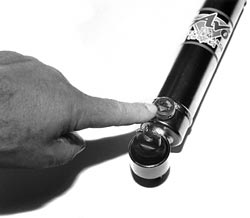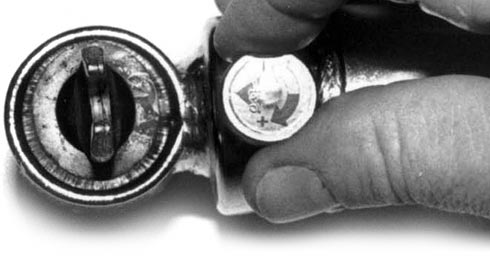
Step #3: Rear Shock Adjustment: When it comes
to the back shock absorber, the idea is to shock
the tire as hard as possible (track conditions
permitting). Keep in mind that it's the shock
that actually controls how much force or "hit"
your applying to the slick. If the shock is
too loose on the extension (rebound), then you
might get way too much rear body separation.
If the shock is too tight, then the car will
flatten the tire excessively or simply cause
the car to spin. Generally speaking, start soft
on the rear and keep tightening up the valving
until the car slows down.
Moving Up The Sophistication Ladder...
As the prices for shocks increase, so does
the adjustment range. For example, AFCO shocks
are available as single adjustable and double
adjustable assemblies. A single adjustable shock
allows adjustment of the rebound while the shock
assembly is still mounted in the car.
 |
|
This
is the adjustment knob found on
the Hal Corp Stocker Star. Once
installed, the knob is accessible
through the side of the spring.
|
|
A double adjustable shock allows adjustment
of the compression valving and rebound valving.
In an AFCO double adjustable, the compression
is adjusted by adjusting the knob from 1 (softest)
to 8 (stiffest). Due to the precision of the
adjuster, only a 1/2 number change is necessary
to make a noticeable change. The rebound adjuster
is extremely sensitive to change. 1/4 turn will
make a significant change in tuning the chassis.
In the AFCO shock, there are 12 settings to
choose from.
Internally, AFCO incorporates what they call
"Velocity Sensitive Valving". According to AFCO,
this valving package is extremely sensitive
to the speed at which the shock piston is moving:
"At the starting line, because of the intersection
point, engine torque, gearing, tires, center
of gravity relative to ground, the shocks will
see the highest shaft or piston speeds. To control
the suspension, the shock needs to be stiffer
at the launch than down track. The AFCO Eliminator
shocks with their new valving actually react
more stiffly when needed at the launch yet stay
softer for riding the track's irregularities
down track. Also, this new valving system is
extremely sensitive to chassis tuner input:
Small changes in the valving will make a noticeable
change in the performance of the chassis."

Typically, the Hal Corp Stocker Stars have an
adjustment range of 12 clicks. The actual range
works like this: six clicks clockwise equals
50/50 valving (approximately). The full stop
counterclockwise (front shock baseline) has
valving that's similar to a 90/10. Once you
pass six clicks clockwise, the adjuster works
primarily on extension (rebound). When the shock
is past this point, the valving is quite stiff,
and probably won't be needed on a drag car.

|